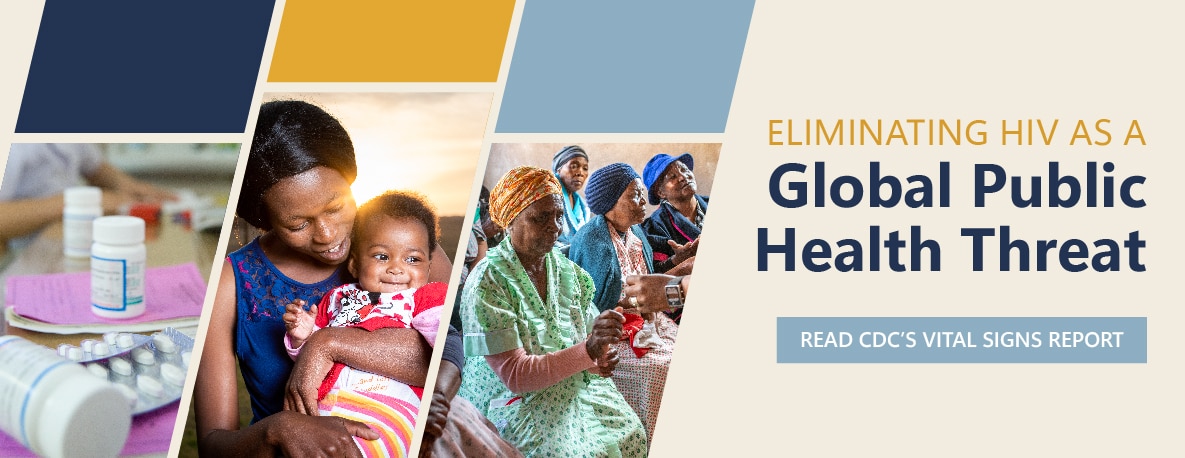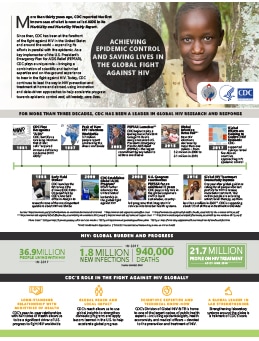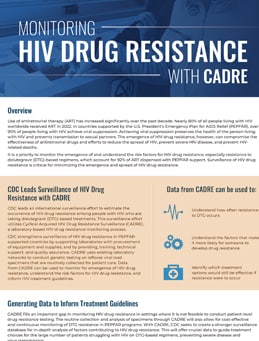Leading Progress to End the Global HIV Epidemic
More than four decades since the first cases were reported, HIV is still a leading cause of death and a health threat to millions worldwide. While innovations in HIV care, treatment, and prevention now help people with HIV to enjoy longer, healthier lives, many people are not benefiting from the latest scientific advances, mainly due to stigma and discrimination. Strong partnerships, dedication to eliminating stigma and discrimination, and ensuring equitable access to quality, people-centered HIV services, remain central to sustaining progress and ending HIV as an epidemic. This requires the equitable use of effective treatment and prevention programs focusing on populations disproportionately impacted by HIV.
As a key implementing partner of the U.S. President’s Emergency Plan for AIDS Relief (PEPFAR), CDC works side-by-side with ministries of health, civil and faith-based organizations, private sector, and other on-the-ground partners to improve methods for finding, treating, and preventing HIV. The investments made today will save lives, strengthen communities, and pave the way for long-term sustainability.
Eliminating HIV as a Global Public Health Threat
In 2003, the U.S. President’s Emergency Plan for AIDS Relief, or PEPFAR, was announced. When it was launched, PEPFAR became the largest commitment by any nation to address a single disease in history. At the time, HIV was a global crisis, devastating families, communities, and economies worldwide—particularly in sub-Saharan African countries.
As a key implementing agency of PEPFAR, CDC has played a critical role since its inception, bringing more than four decades of scientific and technical expertise to bear in the global fight against HIV.
A new analysis published this week in CDC’s Morbidity and Mortality Weekly Report reveals that, since 2004, a year after it was launched, the number of people with HIV receiving lifesaving treatment through PEPFAR increased an astonishing 300 times — from just 66,500 individuals in 2004 to more than 20 million people in 2022.
Tracking Impact
Latest Research
Latest research from CDC on global HIV and TB.
- Vital Signs: Progress Toward Eliminating HIV as a Global Public Health Threat Through Scale-Up of Antiretroviral Therapy and Health System Strengthening Supported by the U.S. President’s Emergency Plan for AIDS Relief — Worldwide, 2004–2022 | MMWR This report examines the impact of PEPFAR’s global efforts to scale-up lifesaving HIV treatment from 2004-2022, resulting in 20 million persons with HIV infection receiving PEPFAR-supported ART. Read more
- Scale-Up of HIV Antiretroviral Therapy and Estimation of Averted Infections and HIV-Related Deaths — Uganda, 2004–2022 | MMWR. This CDC study shows the impact of a massive scale-up of PEPFAR-supported antiretroviral therapy in Uganda from 2004 – 2022 which helped avert nearly 500,000 HIV infections, including more than 230,000 infections among HIV-exposed infants, and almost 600,000 HIV-related deaths. Read more
- Defining the Global Research and Programmatic Agenda and Priority Actions for Voluntary Medical Male Circumcision for HIV Prevention. | SpringerLink. A review of progress made 15-years after implementation of voluntary medical male circumcision programs in 15 prioritized countries in Eastern and Southern Africa. Read more
- Impact of the DREAMS Program on New HIV Diagnoses in Adolescent Girls and Young Women Attending Antenatal Care — Lesotho, 2015–2020 | MMWR (cdc.gov). Three and a half years after implementing the DREAMS (Determined, Resilient, Empowered, AIDS-Free, Mentored, and Safe) program, new HIV diagnoses among adolescent girls and young women attending antenatal care decreased 71.4% in two districts in Lesotho. Read more
- Pediatric HIV Case Identification Across 22 PEPFAR-Supported Countries During the COVID-19 Pandemic, October 2019–September 2020 | MMWR (cdc.gov). Data from 22 countries supported by the U.S. President’s Emergency Plan for AIDS Relief (PEPFAR) during October 2019 – September 2020 show reduced pediatric HIV testing and diagnoses during the COVID-19 pandemic and successful strategies used to reduce these impacts and optimize pediatric HIV testing services. Read more
- Lessons Learned from Programmatic Gains in HIV Service Delivery During the COVID-19 Pandemic — 41 PEPFAR-Supported Countries, 2020 | MMWR (cdc.gov). Analysis of PEPFAR data from 41 countries shows an overall increase in HIV treatment and viral load suppression during the early part of the COVID-19 pandemic. The report highlights factors that contributed to programmatic gains in HIV services. Read more
CDC’s Impact Around the Globe
Learn how CDC and partners are adapting services and expanding key treatment and prevention activities to end HIV.
- Partnership for Success: CDC and Botswana Lead Progress Toward HIV Epidemic Control Read More >
- Uganda Significantly Reduces Rates of Mother-to-child Transmission of HIV With CDC Support Read More >
- Voluntary Medical Male Circumcision Reduces New HIV Infections in Mozambique Read More >
- Healthy and Alive in South Africa; Thanks to Antiretroviral Treatment Read More >
- DREAMS: Making Futures Possible in South Africa Read More >
- Amplifying U=U Message Through Social Media Read More >
Factsheets
An overview of CDC’s global efforts in response to one of the world’s greatest health threats.




